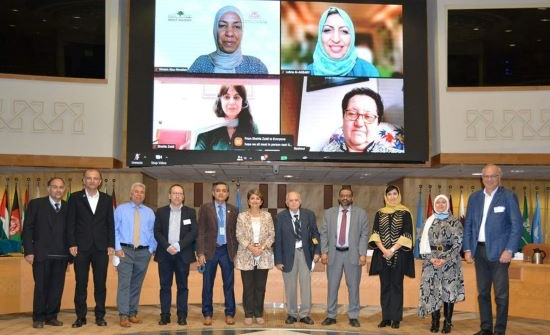
29 May 2022, Cairo – A meeting of the Eastern Mediterranean Advisory Committee on Health Research took place on 15 and 16 May 2022 to discuss regional research priorities and initiatives, enhancing research governance and building the capacity of health information, research and evidence-to-policy systems and processes in the Region.
The meeting was organized in blended format by the Science, Information and Dissemination (SID) Division and was attended by Committee members from Egypt, the Islamic Republic of Iran, Morocco, occupied Palestinian territory, Pakistan, the Syrian Arab Republic, Tunisia, United Arab Emirates and the United States of America, as well as WHO staff from the Regional Office and WHO headquarters.
The specific objectives of the meeting were to inform and seek advice on: 1) research priorities and initiatives for the Region (2020-2023); 2) enhancing the capacity of research in response to the pandemic and lessons learned; 3) research governance and case studies on research ethics governance in countries of the Region; 4) progress in implementation of the regional action plan for evidence-informed policy-making; 5) enhancing national health information systems and data/research-to-policy processes; and 6) best methods for supporting health research systems and institutions in the Region.
In his inaugural address, Dr Ahmed Al-Mandhari, WHO Regional Director, emphasized that one of WHO’s key roles was to support national health systems through research and that the regional Vision 2023 also called for supporting the generation, translation and implementation of research in the Region.
The agenda covered sessions on research governance and ethics, regional and national priorities, and relevant WHO research initiatives. In addition, recommendations were sought through focused discussions on the regional agenda for research prioritization, enhancing national research capacity, the COVID-19 response, research governance and ethics, and evidence-informed policy-making.
The sessions were chaired by Professor Mohamed Fathallah (Egypt), Professor Hechmi Louzir (Tunisia), Dr El Sheikh Badr (United Arab Emirates), Professor Ali Mokdad (United States of America) and Dr Arash Rashidian (Director, Science, Information and Dissemination, WHO Regional Office).
In her closing remarks, Dr Rana Hajjeh, Director of Programme Management at the WHO Regional Office, highlighted that there could not have been a better time to hold the meeting and seek the advice of such renowned experts on research for health.


